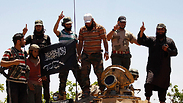
Israel cautious as Syria prepares for contentious elections
As rebel forces, some linked to al-Qaeda, settle on the Syrian side of Golan Heights, IDF watching carefully for change in situation.
“I think there’s some awareness of potentially negative developments but it’s not even close to panic,” Mark Heller of the Institute for National Security Studies told The Media Line. “There are concerns that things might slip out of control. Either side might try to drag Israel into the fighting, or stray weapons could be fired across the line (between Israel and Syria), or there could be some kind of total collapse.”
While all of these scenarios remain unlikely, Israel is beefing up its forces along the Israel-Syria border while taking a wait-and-see attitude. In the past week, rebel forces reached the foothills of the Golan Heights, which Israel acquired from Syria in 1967 and later annexed. There are dozens of different rebel groups fighting against the Assad regime, including some with a virulently anti-Israel agenda, but for the moment they seem to be more concerned with fighting each other than with fighting the Jewish state.
Related stories:
- Syrian al-Qaeda reach foothills of Golan Heights
- Golan Heights Druze want to vote for Assad: 'We're Syrians'
- Former Israeli prisoner killed in fighting with Syrian rebels
While insurgents have made gains near the border with Israel, Assad’s forces have gained strength in other parts of Syria. In Homs, pro-Assad forces took over the city earlier this month after signing a deal that allowed the rebel forces to leave. In Aleppo, pro-government forces seem to be on the verge of cutting-off the rebel supply lines and retaking the city that has been a center of resistance.
Elections are slated to be held on June 3, and Syrian President Bashar Al-Assad is expected to win another seven-year term despite violence that has killed more than 160,000 people and left millions more homeless in the past three years. In the run-up to the election, there has been more violence, most recently a mortar attack that killed 39 people, including women and children, at a pro-Assad rally in Deraa. It was the first attack to target an election event and raised fears that more attacks will follow.
When the civil war in Syria first broke out, Israeli officials and analysts, including former Defense Minister Ehud Barak, were convinced that Assad would be either killed or forced to flee Syria. Now, with the fighting in its fourth year, Assad seems poised to win re-election.
Foreign aid
The United States and the international community have recently begun helping the rebel forces with non-lethal and humanitarian aid, but it has not been enough to turn the tide in their favor. Officially, Israel’s policy is to remain neutral in the stand-off between the Syrian president and those seeking to remove him from office, many of whom are fractured into dozens of different groups. Israel has treated at least 800 wounded Syrians in field hospitals set up to accommodate casualties from the neighboring civil war, but has not allowed any Syrian refugees to enter the country.
“We are not taking sides and I think that’s the right thing to do right now,” Zaki Shalom, a professor of international relations at Israel’s Ben Gurion University told The Media Line. “We have achieved deterrence with Assad and we want to maintain that.”
In an agreement with the international community, Assad agreed to allow almost all of his chemical weapons stocks to be destroyed, an effort he has basically complied with over the past months. That destruction means that the threat of a chemical weapons attack by Syria – a threat Israel had taken seriously – has now been neutralized to a large extent.
Israel has not hesitated to act when it felt its vital interests were at stake. According to foreign reports which have not been officially confirmed by the Israeli government, Israel has carried out a series of military strikes inside Syrian territory against convoys of arms on their way to Hezbollah terrorists in south Lebanon. In each case, there has been no reaction from the Syrian government.
Officials in Jerusalem say that the border between Israel and Syria has been the most quiet of all of its borders. In many ways, an ongoing conflict in Syria serves Israel’s interests. However, if one side is going to win, Israel prefers Assad over the Syrian rebels.
“We don’t even know who the rebels are – there are Salafi groups (an extremist version of Islam) and al-Qaeda,” he said. “I don’t think Israel is very enthusiastic about them taking over in Syria. When it comes to Assad, we’ve managed to get along quite peacefully with him for many years.”
Article written by Linda Gradstein.
Reprinted with permission from The Media Line.










